Matthew Carr's Blog, page 11
December 19, 2023
Unholy Land

I tend to be wary of invoking the concept of genocide in relation to armed conflicts involving civilians, regardless of how horrific such conflicts may be. Because genocide is seen as the crime of crimes, the term is sometimes used for political purposes, and can up trivialising or devaluing real historical episodes of genocide in order to make horrific atrocities seem even worse than they are by imagining them as the worst thing they can be. But the killing of civilians in wartime has many different aims that aren’t necessarily genocidal, and it isn’t necessary to describe them as genocidal in order to condemn them.
The 1948 United Nations Convention on Genocide, following the Polish jurist Raphael Lemkin’s hard-won introduction of the term at the Nuremberg Trials, defined genocide as the intent ‘to destroy, in whole or in part, a national, ethnical, racial or religious group.’ This aim can be pursued by all or some of the following actions: killing members of a particular group; causing serious bodily or mental harm to members of the group; deliberately inflicting on the group conditions of life calculated to bring about its physical destruction in whole or in part; imposing measures intended to prevent births within the group, and forcibly transferring children of the group to another group.
Thanks for reading Matt Carr’s Infernal Machine! Subscribe for free to receive new posts and support my work.
From a legal perspective, genocide differs from the category of crimes against humanity, which was also introduced by the prosecutors at the Nuremberg Trials as a legal novelty. Crimes against humanity can include all of the acts listed above, but such acts need not constitute an attempt to annihilate an entire group because the victims of such crimes are members of that group.
And the reason I raise the subject now, is because it is difficult to avoid the conclusion that the ongoing annihilation of Gaza constitutes a deliberate attempt ‘to destroy, in whole or in part, a national, ethnical, racial or religious group’ by ‘deliberately inflicting on the group conditions of life calculated to bring about its physical destruction in whole or in part.’ According to the Euro-Med Human Rights Monitor, Israel has killed 25,000 Palestinians, including 10,000 children and 3,109 women. It has wounded 50,112 Palestinians, hundreds of them critically. There are now 1.850 million displaced people in Gaza, out of a population of just over two million. Some 62, 990 housing units have been destroyed and 172,055 partially damaged - representing some sixty percent of the total housing stock.
Israel has attacked 286 schools, 1, 356 industrial facilities, 124 health facilities, including 22 hospitals, 141 mosques, 3 churches, 210 health personnel, and 83 journalists. According to a study by the Open University of Israel, the ratio of civilian deaths amongst those killed in Israeli airstrikes is 61 % - a figure higher than the average of all wars during the 20th century.
Even if you accept Israel’s explanation that is targeting ‘terror targets’ who ‘hide behind civilians’ etc, this devastation goes way beyond the doctrine of proportionality in international humanitarian law, which prohibits attacks ‘expected to cause incidental loss of civilian life, injury to civilians, damage to civilian objects, or a combination thereof, which would be excessive in relation to the concrete and direct military advantage anticipated.’
In a single attack on Jabalia camp in October, Israeli airstrikes killed at least 50 Palestinians and wounded 150 more, supposedly in order to kill one Hamas leader who may not even have been there. Fifty civilians for one leader may seem ‘proportional’ to Israel and its supporters, when dealing with a Gazan population habitually written off as less than fully human, but there is no code of international law or morality in which such ratios are acceptable.
This is staggering, incomprehensible destruction that defies any notion of Israel ‘defending itself. Nor can it be understood in terms of collective punishment. Israel is not just punishing Gaza. It is not just attacking Hamas. It is not just taking ‘excessive’ revenge for 7 October. It has used the most advanced military hardware at its disposal to dismantle the sinews that make it possible for Gazan society to exist. It has driven nearly two million people into an area not much bigger than Heathrow, who it continues to attack even as it continues to make much of the north of Gaza uninhabitable.
In short, this is destruction on an entirely different scale to the previous Gaza wars. As the Palestinian lawyer Diana Buttu observed yesterday:
Let’s assume the bombing stops tomorrow. Most homes are uninhabitable – where do you send all these people? How do you provide for them? Where are the shops, the schools, the universities, the hospitals?
These questions raise other questions. If it’s true, as Clausewitz famously argued, that ‘War is a mere continuation of policy by other means’, then what is the policy? Clausewitz also stated that ‘No one starts a war - or rather no one in his senses ought to do so, without first being clear in his mind what he intends to achieve by that war and how he intended to conduct it.’ So what is Israel trying to achieve through such devastation?
Netanyahu has said that his war aims are to eliminate Hamas and obtain the release of the hostages, but neither he nor anyone else has explained how Israel can achieve either of these objectives through military force, let alone this kind of military force. And these aims are not as straightforward as they seem. How will it be known that Hamas has been eliminated? Does ‘Hamas’ refer only to its armed wing or to government employees, teachers, and local officials? Who or what will replace Hamas if it is destroyed?
There are no clear answers to any of these questions. So far US diplomacy has focused on helping Israel achieve its nebulous military aims and providing Israel with the weapons to achieve them, while making occasional mild criticisms regarding the ‘tolerable’ number of casualties - a high benchmark as far as Palestinians are concerned. Biden and Blinken’s team, and now the hapless Sunak, have also tried to breathe life into the punctured balloon known as the ‘two-state solution.’ But the Israeli ambassador to the UK has explicitly said there can be no two-state solution, and so has Netanyahu.
There has also been discussion about bringing the discredited Palestinian Authority back into Gaza, though no one seems to have considered whether Gazans would accept that outcome. Some politicians and think tanks have floated the possibility of an interim international force to run Gaza, along the lines of the UN in Kosovo or the Multinational Force and Observers (MFO) in the Sinai. But Israel has said that will not allow any of this, and the Gazans - well who has ever asked them anything?
But if Israel has said what it doesn’t want, it hasn’t said what it does want. Is it trying to create a ‘buffer zone’ in the north of Gaza? Or a permanent military presence in the strip? How much control is it seeking? No one knows. Even the army doesn’t seem to know what is expected of it, beyond the continuation of military operations in which 117 Israeli soldiers have been killed - significant losses for a country that doesn’t like to lose any soldiers.
In other words, we are in that most dangerous of places - a war without any clear goals or endpoint, waged by a state that believes it has an unlimited licence to inflict whatever destruction it sees fit, supported by allies who lack the courage or the wisdom to bring it to its senses.
As unhinged as it seems however, this devastation may not be entirely irrational or purposeless. In October the Israeli Misgav Institute for National Security & Zionist Strategy published a paper arguing that the current conflict offered ‘a unique and rare opportunity to evacuate the entire Gaza Strip’, and suggested that the population of Gaza could be housed in empty apartments in Cairo.
The ‘Decisive Plan’This is a novel variation on an old tradition. There has always been a radical sector of the Israeli right that favours the removal of the Palestinian population from the Occupied Territories as a preferable alternative to Netanyahu’s ‘state minus’ - a permanently subjugated and disaggregated entity under the supervision of a supine Palestinian Authority. In 2017 Bezazel Smotrich, an extremist settler leader from the West Bank spelt out a ‘Decisive Plan’ to end the Israeli-Palestinian conflict that he claimed would ‘win the conflict, rather than merely managing it,’ and achieve ‘a victory founded on the understanding that there is no room in the Land of Israel for two conflicting national movements.’
Smotrich argued that the Palestinians of the West Bank would be given two choices: they could continue to live under Israeli rule but without any national political rights; or they could ‘emigrate’ to the Arab world and receive Israeli and international help to do this - no one can say the Smotriches of the world lack compassion. Given the events of the last seventy-five years, it was logical to assume that not all Palestinians would accept these options, Smotrich took this possibility into consideration:
It is of course safe to assume that not everyone will adopt one of these two choices. There will be those who will continue to choose another "option"—continuing to fight the IDF, the State of Israel, and the Jewish population. Such terrorists will be dealt with by the security forces with a strong hand and under more manageable conditions for doing so.
This terrifyingly eloquent document is the plan that Smotrich considers ‘the most just and moral by any measure—historical, Zionist, and Jewish—and it is the only option that can lead to quiet, peace, and real coexistence.’ There is no chance it can lead to any of these things, but it is well-worth reading in its entirety, because it really does spell out what the Israeli right is actually like, to those who may not be aware of it, and it is a testament to the truly dangerous forces that have been nurtured in the Occupied Territories and beyond throughout the ‘peace process.’
Smotrich doesn’t talk much about the Gaza Strip, but his objections to a Palestinian state in the West Bank (Judea and Samaria in settler-speak) are partly based on what he thinks about Gaza:
Under the present reality, the establishment of an Arab terror state in Judea and Samaria, a state whose territory is twenty times larger than the Hamas terror state in the Gaza Strip, would be nothing less than suicidal (from the security perspective)
Of course, Smotrich’s mad suggestion that Palestinians who accept Israeli supremacy can remain in Israeli territory is not intended to be taken seriously. He is as aware as anyone else of the ‘demographic challenge’ to Israel’s identity as an exclusively Jewish state, if the Palestinian struggle ever ceased to be a national struggle and became a struggle for civil rights within an enlarged Israel that includes the population of the Occupied Territories.
No way does Smotrich want that. Nor does he want the Palestinian Authority back in Gaza. In 2015, he declared that ‘The Palestinian Authority is a liability, Hamas is an asset.’ Why? Because Hamas is ‘ a terrorist organization, no one will recognize it. ‘ As the Times of Israel reported two months ago, this was Netanyahu’s position too, until the strategy blew up in his face on 7 October.
Now, Smotrich has told an Israeli media outlet that ‘Israel needs to ensure as quickly as possible that there is nobody to talk to on the other side. That's the goal: to destroy Hamas, so that there won't be anyone to talk to on the other side.’
That ‘nobody’ means what it says. In November, Smotrich supported a proposal for the ‘voluntary emigration’ of Gazans to any country that would accept them, and declared that ‘The State of Israel will no longer be able to accept the existence of an independent entity in Gaza’.
Given that Smotrich is Finance Minister in Netanyahu’s government - a government which even the United States admits is the most extreme in Israel’s history, it is worth asking whether Israel is now using the events of 7 October as the pretext to implement these proposals.
In an article in the excellent 972 magazine, Orly Noy, the chair of B’Tselem argues that the Israeli public has undergone a process of Smotrichization as a result of 7 October, to the point when it is prepared to accept the kind of radical solutions that were once the preserve of the Kahanists and settler-extremists. It is not clear whether any such consensus exists - yet. But the shock of 7 October and its vengeful aftermath mean that nothing can be ruled out. You know a threshold has been crossed, when proposals like this are floating through the public domain:

Ideas like this are not limited to the settler fringe, even if few would invoke the Holocaust to propose them. In 2004 the historian Benny Morris - a self-proclaimed leftist - criticised Ben Gurion for having failed to ‘finish the job’ by removing all Palestinians in 1948. Asked whether he supported ‘the transfer and expulsion of the Arabs from the West Bank, Gaza and perhaps even from Galilee and the Triangle’ Morris replied ‘not at this moment’, adding
But I am ready to tell you that in other circumstances, apocalyptic ones, which are liable to be realized in five or ten years, I can see expulsions.
Are we now living in these ‘apocalyptic’ times? Israel is unlikely to admit publicly that it wants to annex Gaza and drive its population out. But, as in 1948, it can do everything possible to bring about this outcome without declaring explicitly that this what it’s doing.
If the war continues at the same level of intensity, it is difficult to see how nearly two million people can continue to survive the winter without water, shelter, fuel, electricity, medical treatment or food, or without outbreaks of disease that will accelerate the calamity. The point may be reached, when Gazans flee into Egypt, and Egypt may have no choice but to accept them, and Israel will be very unlikely to take them back.
In other words, we may be witnessing the intentional destruction of the Gazan Palestinians an ethnic/national group. Bear in mind that the Palestinians don’t have to be physically killed in order to be victims of a genocide. It’s enough for Israel to destroy everything that makes it possible for their society to exist. Even Sky News has considered the long-term hypothetical strategic possibilities behind these operations:
If Israel's aim was an expanded state, then the military objective might be to clear Gaza, level the infrastructure, create a humanitarian crisis, and force Palestinians to leave Gaza.
It is increasingly clear that despite Israel's previous diplomatic prevarications, their objective is not limited to "solving the Hamas problem".
All this is happening in real time, with the support and collusion of the same liberal democracies that (rightly) opposed the Russian invasion of Ukraine. And if it succeeds, and the Palestinians are driven into the Sinai or evacuated from Gaza, it will solve nothing and win nothing. It will be the end of any moral illusions that still hover around the Israeli ‘villa in the jungle’ and a giant step towards the transformation of Israel into an ethnofascist state.
It will, as even former defence secretary Ben Wallace wrote in the Telegraph yesterday, provide a catalyst for another fifty years of conflict. More than anything else, it will result in the deaths of thousands more Palestinians than have died already. All of which makes it a moral imperative for the governments that have supported and enabled this mayhem so far to use their power and influence to bring Israel to its senses.
And they will not do this without serious pressure from the millions of people who see what is happening and understand why it is happening, and who know, that if it looks and sounds like genocide, it may be because - this time - it actually is.
Thanks for reading Matt Carr’s Infernal Machine! Subscribe for free to receive new posts and support my work.
December 12, 2023
Old Post: Sheridan in Gaza

I’ve been reading The Drone Eats With Me , by the Palestinian writer Atef Abu Saif. It’s a searing firsthand account of the 2014 Israel-Gaza war, which Israel called ‘Operation Protective Edge, which records in powerful, vivid, and often heartbreaking writing, a campaign that was horrific enough at the time, but seems almost like a skirmish in comparison with what is taking place now.
Not only does it provide a Palestinian perspective that is too often absent from media coverage of Israel’s wars with the Palestinians, but it’s also a reminder that Gaza is a society, not a terrorist enclave or ‘nest’.

This is the society that was attacked in 2014, and is being attacked now. And The Drone Eats With Me is a very human portrayal of Gaza under the bombs and before the bombs. In this world where death can strike anyone at random, there are also picnics on the beach; children’s birthday parties; internet cafes; Ramadan feasts, picnics, and sweet-sellers; kids with Playstations; cafes where men meet to watch the World Cup or talk politics; universities, schools and classrooms where students, learn, study, and read books; neighbourhoods, communities, and families who know the names of their neighbours annihilated by a drone strike, or the name of the little girl literally blown to nothing by a missile that hit her directly.
Such things should not be a surprise, but in a western world that too often looks at Gaza entirely through Israeli eyes, they tend to be eclipsed by the mere evocation of the word ‘Hamas’, and by dehumanising stereotypes that reduce an entire society to ‘terror enclaves’ and the sum of its armed groups.
Israel has been doing this for a long time, and what we are seeing now is the consequence of that. So I really recommend you read Abu Saif’s fine, moving book as an antidote to this toxic reductionist propaganda, at a time when we are all being forced to watch the annihilation of an entire society in real time.
And this dehumanisation is not exclusive to the Palestinians. Israel’s military modus operandi, and the propaganda that accompanies it, belongs to a long tradition of European colonial violence, in which mostly non-white peoples are depicted as barbarians, savages, and inhuman others who can be killed and humiliated with impunity.
Looking back at some of the pieces I wrote during Operation Protective Edge on my old Wordpress blog, I found the following post about the continuity between America’s wars against the Plains Indians and Israel’s high-tech military onslaught.
It was written in August 2014, but much of what it describes could have been written about the terrifying slaughter which is now unfolding in front of our eyes. The difference is one of scale and intensity. In 2014, Israel attacked Gazan society. Now, with the support of the US, the UK, and the European Union, it seems intent on destroying everything that holds that society together.
Sheridan in GazaDespite the growing media criticism of Israel during the Gaza ‘conflict,’ there is still a general reluctance amongst mainstream journalists to acknowledge or analyse the broader strategic logic of Israeli violence. Too often, journalists accept the dominant Israeli narrative that its actions in Gaza are entirely directed towards stopping the rockets and exchanging ‘quiet for quiet’.
Even when Israeli strikes go well beyond what Israel calls ‘terror targets’, journalists bend over backwards to present such actions as tragic aberrations or accidents, and limit their criticisms to the question of whether or not they are ‘proportionate’ to the central task of defending Israel and stopping Hamas from firing rockets and shutting down Gaza’s ‘terror tunnels’.
Journalists like Jon Snow might criticize specific Israeli attacks on schools and hospitals, but time and again, Israeli spokesmen are allowed to bring the conversation back to the subject of Hamas rockets, and whether or not Hamas is using human shields, and the difficulties in waging war against ‘terrorists’ in densely-populated areas, etc, etc. These questions are certainly worth asking, but the idea that Israel has attacked Gaza’s fishermen, wheatmills, power and sewage plants, hospitals, mosques and schools simply in order to protect itself from Palestinian rockets is not really credible.
So why is Israel attacking these targets?
On one hand Operation Protective Edge is the latest manifestation of a tradition that is deeply-embedded in Israeli military practice, of massive retaliation in response to any acts of violence directed against Israeli soldiers or the Israeli population. This response is invariably aimed not just at the armed combatants responsible but at the populations that support or merely tolerate their presence.
In recent years this strategy has sometimes become known in Israeli military circles as the ‘Dahiya doctrine’, after the Hezbollah stronghold of Dahiya in Beirut which was leveled by Israel during the 2006 Lebanon War. But it has been practiced in one form or another ever since Palestinian fedayeen began carrying out cross-border attacks against Israel in the mid-sixties.
Israel’s strategy of retaliation is based on a crude and to some extent counterintuitive assumption: bomb and hurt civilians enough and they will turn their anger not against Israel but against the armed groups in their midst. The fact that this strategy has rarely succeeded hasn’t stopped Israel from trying it again and again, and the war in Gaza is one more attempt.
But as Greg Shupak points out in a fine piece for Jacobin magazine, Israel’s assault on Gaza cannot simply be explained by the Israel strategy of ‘counterinsurgency’ through terror and collective punishment. Shupak argues that its targeting of Palestinian infrastructure, agriculture, cultural and religious institutions is ultimately intended to make it impossible for Palestinian society in Gaza to sustain itself, and that such violence is intrinsic to the Zionist project and peculiar to settler-colonial societies.
Shupak’s suggestion that Gaza belongs to a tradition that includes the ‘clearing of the plains through the deliberate starvation of Aboriginal peoples’ in American and Canada is not something that you are likely to hear on Sky News or the BBC, but it is by no means outlandish. In the aftermath of the American Civil War, Union heroes General William Tecumseh Sherman and General Philip Sheridan were placed in charge of the US Army’s campaigns against the Plains Indians.
Sherman was famous for his scorched earth campaigns against Southern civilians during his army’s rampaging march through Georgia and the Carolinas, while Sheridan had overseen similarly destructive campaigns in response to Confederate ‘bushwhacker’ attacks in the Shenandoah Valley in Virginia. The essential premise of these campaigns was that civilians as well as soldiers were legitimate objects of war, and the Dahiya doctrine would not have shocked ‘ Little Phil’ Sheridan.

In 1870 Sheridan attended the Franco-Prussian War as an observer. Asked by Bismarck what Prussia should do in response to French guerrilla attacks on his troops, he reportedly replied:
The proper strategy consists in inflicting as telling blows as possible on the enemy’s army, and then in causing the inhabitants so much suffering that they must long for peace, and force the government to demand it. The people must be left with nothing but their eyes to weep with over the war.
This was not a theoretical formulation. Sheridan himself had used these methods against the Sioux, Comanche, Cheyenne and other Plains Tribes who obstructed white settlement and the completion of the transcontinental railroad in the aftermath of the Civil War. Between 1869 and 1883, Sheridan’s forces fought 619 separate engagements with the Plains Indians. Many of these battles took place in winter, when the US cavalry deliberately targeted the horses, food supplies and non-combatant populations of Indian tribes who refused to go to reservations, in order to starve them into submission.

In a letter to Sherman in 1873 Sheridan justified these methods in terms that many Israeli generals would find entirely familiar:
If a village is attacked and women and children killed, the responsibility is not with the soldiers but with the people whose crimes necessitated the attack. During the war did one hesitate to attack a village or town occupied by the enemy because women or children were within its limits? Did we cease to throw shells at Vicksburg or Atlanta because women or children were there?
Sheridan’s campaigns in the West were not simply intended to win wars and prevent attacks on settlers. He also attacked the material basis of Plains Indians society, by encouraging the hunting of buffalo herds by white hunters. Between 1872 and 1874 an estimated 3, 700,000 buffalo were slaughtered in the West, of which only 150,000 were killed by Indians. In 1875 Sheridan praised the hunters responsible, saying that they
have done more in the last two years, and will do more in the next years, to settle the vexed Indian question, than the entire regular army has done in the last thirty years. They are destroying the Indians’ commissary, and it is a well-known fact that an army losing its base of supplies is placed at a great disadvantage.
These efforts were carried out in accordance with official US government policy, which ordered the Plains Indians to assimilate or face extermination. Zionism has never extended such a ‘choice’ to the Palestinians whose lands it occupied and continues to colonize and absorb. Faced with a population whose existence has always been incompatible with the notion of a Jewish state, it first drove them out, then placed the new populations that it occupied in 1967 in ‘reservations’ in the West Bank and Gaza that were intended to render their inhabitants powerless and entirely subservient to and dependent on Israel.
The Palestinians have never accepted this outcome, and have continued to resist it almost continuously. Such resistance was one of the reasons why Ariel Sharon withdrew from Gaza in 2005, in the hope of handing over responsibility for policing the Gaza Strip to the Palestinian authority. When that plan was thwarted by Hamas, Israel imposed a new form of occupation by remote control, which transformed Gaza into something between a reservation, a prison, and a free fire zone, while using its military power to undermine any attempts by the Gazans to achieve an autonomous and self-sufficient society.
Now the Israeli government appears to have gone beyond its previous policy of keeping Gaza on the brink of collapse and periodically ‘mowing the lawn’, and adopted a policy aimed at the unmaking of Palestinian society in Gaza, through the destruction of all the essential instruments and institutions necessary for the long-term survival and autonomy of a modern society – and a Palestinian state.
That, not stopping rockets, is what Operation Protective Edge is all about. And someone really ought to ask Mark Regev about it next time they speak to him.
Thanks for reading Matt Carr’s Infernal Machine! Subscribe for free to receive new posts and support my work.
December 8, 2023
Podcast: Grim Up North?

Hi everyone. Just a quick post to draw your attention to Episode 2 of the podcast Grim Up North? that I co-host with the poet and photographer Adrian Scott, whose photo you can see above.
For this episode we’ve done an outside broadcast, as part of a theme we’re going to call ‘Walking the North.’ We’ve gone on a walk through Sheffield’s edges, taking in the past, present, and future of the city of steel.
There’s a lot here: the Beatles, Pulp and Richard Hawley; the ecology of the River Don, Park Hill, Kelham Island, George Orwell, the Sky’s Edge, and there’s also a lot of poetry, especially from Adrian.
So have a listen, and I hope you enjoy it as much as we enjoyed making it. Available here: and on all major streaming platforms.
Thanks for reading Matt Carr’s Infernal Machine! Subscribe for free to receive new posts and support my work.
December 5, 2023
Nazifying Gaza
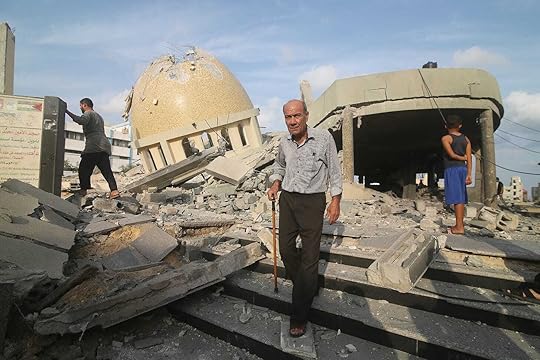 Creative Commons License
Creative Commons LicenseLike many people of my generation, I came of political age in the long slipstream of Nazism and World War II. We grew up in an age of affluence, under the shadow of nuclear extermination, in a world still haunted by the spectre of industrialised genocide and Europe’s descent into racist barbarism. Many of us who came to support the Palestinian people’s long and painful struggle for self-determination did so because we regarded the creation of the State of Israel and the chain of calamities that followed it, as a consequence of European wars and European antisemitic persecution. We saw Zionism, and the British government’s collusion with it, as another variant of European colonialism, which used the fantasy of a ‘land without people for a people without land’ as a justification for the violent territorial dispossession of one people by another.
This did not mean that we were unaware of the unprecedented historical crime that gave Zionism a special moral aura that other forms of settler-colonialism did not have, and the ways in which the persecution and oppression of one people led to the persecution and oppression of another. And the Palestinians have attracted supporters who didn’t care, or who invoked the Holocaust in their criticisms of Israel and Zionism; who called Israelis ‘Zionazis’, and accused Israelis of ‘behaving like Nazis’, or even suggested that Israelis were ‘worse than Nazis’. The word ‘genocide’ was often used too easily and too readily to describe Israeli military operations in Gaza or Lebanon that however savage and destructive, were a long way short of genocidal.
Thanks for reading Matt Carr’s Infernal Machine! Subscribe for free to receive new posts and support my work.
If collective punishment, the killing of civilians, the terror-bombing of cities, and other crimes against humanity, are ‘Nazi’ actions, then many other countries have at times behaved ‘like the Nazis’, whether it was the British in Kenya, the US in Vietnam, Serbia, Saddam’s Iraq, or Syria. Many of the laws used by Israel to oppress the Palestinians in the occupied territories are British Mandate-era laws.
As brutal, oppressive, and illegal as that occupation has been, it is not comparable to the Nazi occupations of Poland, Ukraine, or even France. It does not have a Hans Frank, an Ante Pavelic, a Himmler, and Eichmann or a Mengele, or so many others. Accusations of ‘Zionazism’ have the unmistakable stench of malicious bad faith and the misuse of history for the purpose of political point-scoring. Not only do they obscure the historical singularity of the Holocaust, but they also obscure the very specific forms of oppression that have been directed against the Palestinians.
To see how this works, consider last week’s ‘debate’ between MP Chris Williamson and Talk TV host Julia Hartley-Brewer to discuss the Gaza ‘war.’ Hartley-Brewer clearly invited Williamson onto her show, so that he would say something that would enable her do do some moral grandstanding and gain some ‘shock horror’ clicks, and he didn’t disappoint. At one point he accused Hartley-Brewer of supporting a regime which is ‘behaving worse than Nazis,’ to which she asked him, sarcastically, why he didn’t just shout ‘“ I hate Jewish people” and save everyone time.’
When Williamson called Gaza a ‘concentration camp’, Hartley-Brewer rose to the full force of her fake-indignation. ‘How dare you?’ she erupted, seemingly unaware that concentration camps were not invented by the Nazis, but by the British, and that this concept does not necessarily signify death camps.
It was only to be expected that a conversation between these two would generate more heat than light, but if some Palestinian supporters have used the Nazis to attack Israel and Zionism, Israel and its supporters have long resorted to Nazi analogies in order to justify Israeli violence, and also to delegitimize the Palestinian liberation struggle and anyone associated with it.
Few people exemplify this tendency more cynically than the self-styled defender-of Western civilization Douglas Murray. Since the war began, Murray has become a ubiquitous defender of everything Israel does, haunting the talk shows and Youtube like a kevlar-clad ghoul with his supercilious scowl. One minute you find him calling the Scottish First Minister Humza Yousaf the ‘First Minister of Gaza’ - a libellous charge that he inexplicably got away with - and describing his Palestinian wife as a ‘nasty piece of work.’ Then he pops up to describe Owen Jones as ‘morally sick’, because Jones had the temerity to question some of Hamas’s alleged atrocities, which Haaretz has also done.
And all the time, he churns out columns for the Spectator and the New York Post, and even gets to accompany the IDF into Gaza, for no obvious purpose except to pose for some fetching photo ops against a backdrop of destruction, recycling IDF talking points.
That’s what moral clarity can do for you, and there’s a reason for Israeli largesse.In an article for The Spectator written the week after the Hamas pogrom/assault of October 7, Murray urged the Israelis ‘to respond as they see fit - it isn’t for non-Israelis to give them advice.’ The Charlemagne of the Internet age nevertheless had a few suggestions:
Maybe Israel will cut off Gaza and starve Hamas out. Maybe they will have a full-scale military operation to rescue the Israeli captives. Or maybe they will finally put an end to this insoluble nightmare, raze Hamas to the ground, or clear all the Palestinians from their benighted strip. A strip which Egypt owned but nobody wants.
It’s difficult to understate the inhuman savagery of these recommendations are. Hamas cannot be ‘starved out’ without staving out two million Gazans. The ‘nightmare’ of Gaza was, until October 7, primarily a Palestinian nightmare, stemming from the dispossession of the Palestinians and Israel’s continuing arms-length occupation. It was not, and is not, ‘insoluble’. Nor is Gaza ‘benighted.’ And even if the likes of Murray think that any group of Arabs can be thrown in with any other, attempting to making it an Egyptian problem will not make it any less an Israeli problem.
Last but not least, you cannot ‘raze Hamas to the ground’ without razing Gaza to the ground, which is quite clearly what Murray wants, even though he is too genteel - just - to say it outright. For Murray the concept of ‘innocent Gazans’ is only ever cited in scaremarks, but even he knows that you need some moral justification for what is effectively ethnic cleansing. And this is why, in the Jewish Chronicle no less, we find him arguing that Hamas are ‘worse than Nazis.’
For context, bear in mind that this is a man who told the National Conservative conference in May that the Nazis had ‘mucked up nationalism’, and spoilt it for everyone else, as if militarism, eugenics, white supremacism and state racism, and the persecution and mass murder of millions of Jews were somehow a bit of a cock-up rather than central component of German nationalism.
Nevertheless, it is still something of a leap to argue that because some Hamas operatives bragged about the atrocities that they carried out on October 7, they were worse than the Waffen SS. According to Murray however, ‘Average members of the SS and other killing units of Hitler’s were rarely proud of their average day’s work, in killing Jews’, and even got upset about it:
Very few felt that shooting Jews in the back of the head all day and kicking their bodies into pits was where their own lives had meant to end up. Many spent their evenings getting blind drunk to try and forget. Nazi commanders had to worry about staff ‘morale’. When the war ended, the Nazis tried to pretend that Treblinka and other death camps never existed.
If Murray is referring to the Einsatzugruppen extermination squads that followed the Wehrmacht into the Soviet Union, he may be superficially correct. Most members of these units, as Christopher Browning once argued, were ‘ordinary men’ who did not know what they were expected to do until they were ordered to do it. Some of them may indeed have felt bad about it, but nearly all of did it, even after being told by their officers that they would be no consequences for not taking in these massacres.
It’s also true that Himmler recognized that the mass murder of men, women, and children could have negative psychological consequences for the perpetrators, which is one reason why the Nazis switched from bullets to gas. But Himmler also argued that the willingness of the SS to continue killing Jews despite these consequences only made that enterprise more noble, and there were many Nazis who had no moral qualms whatsoever.
Has Murray ever read Vassily Grossman’s description of Treblinka, or Primo Levi, or Hannah Arendt, or pretty much anyone who ever survived these camps, or the Nazi prisoners of war happily discussing rape and murder on the Eastern Front in Soldaten? As for the fact that the Nazis ‘tried to pretend that Treblinka and other death camps never existed’, after the war, this is just epic stupidity. Of course they tried to cover it up - because they knew the rest of the world would regard these camps as a crime and an abomination, even if they didn’t, which meant that the perpetrators might face execution or jail time.
And yet here is Murray, the bastard son of Bertie Wooster and Unity Mitford, presenting the Nazis as morally-troubled mass murderers in order to place them on a higher category to Hamas and, also to erase the tens of thousands of ordinary Gazans who he knows will be killed. This is why Murray praised the historian Andrew Roberts, for lending his ponderous scholarly weight in the Telegraph to the idea that ‘whereas the Nazis went to great lengths to hide their crimes from the world, because they knew they were crimes, Hamas has done the exact opposite, because they do not consider them to be so.’
So who gets the moral high ground here? Those who organized and carried out that the killing of six million people and sometimes felt upset by it? Or the handful of Hamas operatives who boasted about killing hundreds of Israelis? One for The Moral Maze, for sure. Except that Roberts, knows the answer. Even Himmler is on a higher moral plane to Hamas, because of his infamous description of ‘the extermination of the Jewish people’ as ‘a page of glory in our history that has never been written and is never to be written.’
The tragic loneliness of the long-distance mass murderer, forced to exterminate an entirely defenceless people and yet never able to feel proud of it in public. Who, but the most hard-hearted cynic, doesn’t feel a little sympathy for Himmler and his henchmen here?
Writing of the Nazis who ‘burnt Jews alive in barns on their retreat in 1945,’ Roberts goes on to observe that, unlike Hamas, ‘ they did not film themselves doing it.’ Even though ‘there are plenty of photographs of Nazis standing around death-pits full of Jewish corpses…these were taken for private delectation rather than public consumption.’
Oh well that’s ok then, though you can’t help wondering what these troubled souls would have done if they’d had cell-phones.
According to Roberts, even the 1945 Auschwitz death marches, and the attempts to destroy physical evidence of gassing and extermination, suggest a kind of moral conscience, in comparison with the ‘sheer glee with which Hamas, by contrast, killed parents in front of their children and of children in front of their parents.’ And even though ‘Nazi sadism was routine and widespread, it wasn’t built into their actual operational plans in the way that Hamas’s sadism has been.’
So there you have it: the humiliation and genocidal murder of Jews and Roma people; the systematic annihilation of the Polish intelligentsia; the killing and starvation of Slavic racial inferiors during Operation Barbarossa - none of this was built into Nazi ‘operational plans’. It just sort of happened, and the people who did it sometimes felt pangs of conscience.
Citing Ian Kershaw, Roberts notes the ‘depersonalization and debasement of the figure of the Jew’ that made the Final Solution possible:
Kershaw argues that in Nazi Germany, ordinary Germans’ "‘mild’ anti-Semitism was clearly quite incapable of containing the progressive radical dynamism of the racial fanatics and the deadly bureaucratization of the doctrine of race-hatred." This is still more true of Gaza today.
Ipso facto
Hamas is—while taking into account the wild disparity in the sheer geographical and numerical extent of their crimes—qualitatively even more anti-Semitic than the Nazis were. One thing in which they are exactly equal, however, is that Nazi barbarism had to be utterly extirpated, and that goes for Hamas too.
There is no need, and no one should even try, to legitimize the atrocities carried out by Hamas on October 7 as part of their ‘Al Aqsa Flood’ operations. Rape, torture, and the killing of civilians are war crimes and crimes against humanity, and should be regarded as such, and their perpetrators brought to justice, and held up to universal disgust.
But these attacks were not only directed against civilians. Some of them were directed again Israeli military installations, and fall within the recognized legal category of resistance to occupation. In other words the ‘Israeli-Palestinian conflict’ did not begin on October 7, and cannot be uniquely defined by it. To condemn Hamas’s atrocities, without mentioning 75 years of dispossession, occupation, persecution, and the endless calamities inflicted on the Palestinian people as a whole, and the Gazans in particular, is not ‘moral clarity’, but historical obfuscation.
Talkin’ World War II BluesThis is a game that Benjamin Netanyahu has played many times, and in October he was playing it again, arguing that:
In 1944, the Royal Air Force bombed the Gestapo headquarters in Copenhagen. It’s a perfectly legitimate target. But the British pilots missed and instead of the Gestapo headquarters, they hit a children’s hospital nearby. And I think 84 children were burned to death,” he said. “That is not a war crime. That is not something you blame Britain for doing. That was a legitimate act of war with tragic consequences that accompany such legitimate actions.
As is to be expected from Netanyahu, this is not a valid comparison. RAF Bomber Command did not always attack civilians by accident. Both the RAF and the USAF bombed cities knowing that German civilians would die, and such operations were sometimes carried out in order to kill as many civilians as possible. The fire-bombings of Cologne and Hamburg, for example, were carried out as part of a deliberate strategy to target ‘the morale of enemy civil population, in particular industrial workers’.
One can argue about the morality - not to mention the effectiveness - of these tactics, but they were nevertheless carried out in the context of total war against a powerful industrialised state intent on world conquest that had occupied most of Europe, and was perpetrating genocidal violence on a mass scale.
Hamas, by contrast, is a low-tech ‘resistance’ organization, with a limited military capability, whose operations, until October 7 were mostly ‘symbolic.’ No matter how many homemade rockets it fires, it cannot even begin to compete with the firepower directed against it - not to mention the shocking destruction of hospitals, family homes, and education institutions that has been taking place almost daily for the last two months.
There is is compelling evidence to suggest that Israel has routinely violated any notion of proportionality or military necessity in its operations in Gaza. This week a must-read investigation by +972 Magazine found that up to 100 targets are being selected by an AI program, and that Israel is deliberately attacking ‘power targets’ such as tower blocks, in order to terrorize the civilian population.
By comparing Hamas to Nazis, Netanyahu is inviting the world to accept World War II levels of destruction and violence. By suggesting, as Israeli President Isaac Herzog did, that Gazans are complicit with Hamas because they failed to overthrow it, you can widen the parameters of destruction to include anyone. If you believe, as the former Israeli finance minister Avigdor Leiberman put it this week, that ‘There are no innocent people in Gaza,’ then you can do whatever you want.
We have been here before. Menachem Begin regularly compared the PLO to the Nazis. In 1980 he called the PLO the ‘Arab SS’ and effectively accused the European Common Market of collusion with Nazism because it called for the PLO to have a role in the Middle East peace talks. Begin’s invasion of Lebanon was intended to prevent that possibility, and it turned into a disaster for Lebanon, for the Palestinians, and also for Israel.
The same is likely to occur in Gaza. But if Hamas are worse than Nazis, and Palestinians are the new ‘good Germans’, then no one needs to even think about these consequences. Asked whether it might be true, as Kamala Harris suggested last week, that ‘too many’ Palestinian civilians have been killed in Gaza, Lindsey Graham asked:
What is too many people dying after Pearl Harbour?Did the American public worry about how many people were dying to destroy Tokyo and Berlin?’
If Biden and Harris have established a limit on Palestinian deaths, there is no such limit for those who think that Gaza is Berlin or Tokyo. But if Israel is allowed to destroy the Gaza Strip, it is no more likely to provide a ‘solution’ to the ‘conflict’ than Begin’s invasion of Lebanon. This is what Human Rights Watch reported last week:
On November 9, Israeli airstrikes hit Al-Nasr Medical Center in Gaza City, cutting off the neonatal intensive care unit’s oxygen supply. The attack forced staff to evacuate the next day, leaving babies that could not be transported alone in intensive care, according to Doctors Without Borders. On November 28 during the ceasefire, doctors were able to return and found five babies dead.
We should feel the same horror at such acts that we should also feel at the rape and murder of Israeli women and the killing of children on October 7. And one of the reasons why Israel is getting away with such actions is precisely because too many people have twisted history to make it seem as if such actions are unavoidable and even necessary.
Those who seriously want an end to these horrors, based on justice not vengeance, might consider another World War II reference, from the 1978 film Germany In Autumn. On 8 April 1945, a German woman named Frau Wilde is reported to have said to an American soldier:
When atrocity reaches a certain point, it no longer matters who initiated it, it only matters that it should stop.
We have long since passed that point with the ‘Israeli-Palestinian conflict’. There are moments in history when cruelty becomes politically and morally meaningless and cannot achieve a meaningful result for either side. This is where we are in Gaza. It’s where we’ve been for some time, and we should resist those who seek to turn the crimes and atrocities of the past into false analogies to justify the crimes and atrocities in the present.
November 28, 2023
The Resistible Rise of the Dog-Men
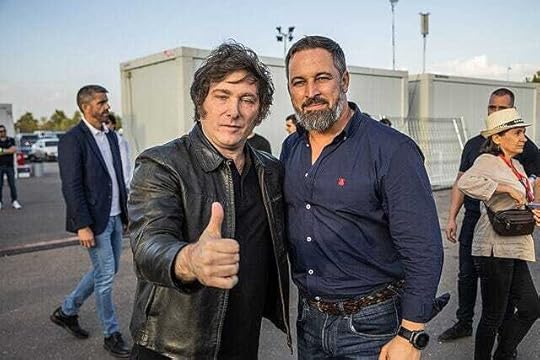
In Leonardo Padura’s epic study of the assassination of Leon Trotsky The Man Who Loved Dogs, the tenderness which both the fictional Trotsky and his assassin feel towards dogs is the common point of humanity between them, as they follow their mutually-terrifying trajectories through the murderous politics of twentieth century communism.
By all accounts Javier Milei, the former tantric-yoga instructor and libertarian economist, who has just been elected president of Argentina, also loves dogs. Milei once had an English mastiff called Conan, and he believes that the two of them met for the first time in a previous life in the Roman Collosseum, where Milei fought as a gladiator.
According to Milei, he and Conan agreed not to fight each other that day, because the dog was destined to become his counsellor and help him achieve his political ambitions. Conan fulfilled this role until he died in 2017, whereupon his bereft owner contacted the animal through a medium. In the course of these telepathic conversations, Conan told Milei that God wanted him to become president, and so in 2018 Milei had Conan cloned, so that his canine consigliere could continue to advise him.
It worked well, so well that this procedure produced five versions of the same dog, which means that Milei has five canine counsellors. One of them is called Conan, and three others are named after Milei’s favourite economists. According to the Argentine media, Milei regularly seeks their advice on political and economic matters, and who would not want to be a fly on the wall during these sessions?
Thanks for reading Matt Carr’s Infernal Machine! Subscribe for free to receive new posts and support my work.
Even by twenty-first century standards, this is an unusual political journey. And as touching as Milei’s cynophilia might be, there was once a time, in the days when something called normal politics existed, when very few voters would have considered placing a man like this in charge of their country.
But politics in the western world has not been normal for a long time. And 14.5 million Argentinian voters - a whopping 56 percent of the electorate - have just elected a president who seeks counsel from his five hounds; who waved a chainsaw around at his rallies; who shouted and ranted at anyone who contradicts him; who called the pope a ‘filthy leftist’, and claimed to hear voices talking to him while being interviewed in an empty tv studio.
LibertylandNone of this was hidden; this was Milei’s public persona. And then there are the policies. The self-styled ‘anarcho-capitalist’ from ‘libertyland’ wants his fellow-citizens to be able to sell their organs on the open market and sell their babies too, because why not? He also wants to eliminate state-funded education and healthcare, replace severance payments to workers fired without cause with unemployment insurance, and privatise everything in sight, because, he argues - or was it Conan? - ‘It has been proven that anything the public sector does, it does it wrong.’
Like all extreme-right/libertarian ’populists’, Milei is anti-climate change (a ‘socialist lie’), anti-feminist, anti-LGBT rights, and anti-anything that intrudes on his right to absolute freedom. His antipathy to the state doesn’t extend to the army and police, however. Milei wants more police, with greater powers to crack down on ‘delinquency’. He wants to lower the age of criminal responsibility to 14, and ‘revalorise’ the Argentine armed forces. Milei questions the numbers of deaths and disappearances carried during the 1976-82 dictatorship’s campaign of state terrorism. He wants to close down the ESMA human rights museum, in the former torture centre at the Navy Mechanical School in Buenos Aires, which I visited this year.
His vice-president and possible security minister is Victoria Villarruel, a passionate defender of the dictatorship, and a co-signatory of the 2020 ‘Madrid Accord’ - an anti-communist alliance created by the Spanish fascist Vox party that sees communism even in places and institutions where communism has long since vanished or never been present.
Some of these more out-there policies were put on mute during the presidential run off, in order to avoid terrifying wavering voters. And already Milei’s plans to dolarise the Argentinian economy have been put on hold, though not his plan to abolish the central bank. Argentina is a country with strong labour unions and a strong civil society, and it remains to be seen whether he will be able to push all his ‘reforms’ through. But the indisputable fact remains: he is the president, and a man like this should not be sitting in the Casa Rosada or any other governmental institution.
When I was in Argentina earlier this year, I heard enough anecdotal evidence to suggest that many voters despised their incumbent government, and were not necessarily disposed to put it back in power, let alone go leftwards. So on one level, Milei’s victory is the latest grim chapter in the tragic historical enigma that is Argentina: a country that until the 1930s seemed destined to become one of the great world powers, and since then has been in an almost constant state of crisis, despite its wealth of natural resources.
With a history like this, Milei’s promise to ‘make Argentina great again’ has a very specific if nebulous resonance, regardless of whether it is actually achievable. And then there is the economy. Inflation in Argentina currently stands at 143 percent, which has pushed some 40 percent of the population below the poverty line. So there is no reason why many Argentinians should feel warmly about the government they have just thrown out.
But still…a poor set of choices shouldn’t mean that you make the worst of all the choices available, should it?
After all, you don’t help the poor by slashing the programmes that provide them with what little assistance they receive. You don’t make people wealthier by adopting the dollar as your main currency when you don’t even have enough currency reserves to pay for it, and when you also plan to abolish your main instrument - the central bank - for controlling monetary policy if things go wrong.
You don’t achieve greatness by electing a ranting, foul-mouthed maverick to the presidency, or by closing Argentina’s National Cinema Institute and CONICET - a scientific institution that any country that considered itself ‘great’ would be proud of. And yet all this is part of Milei’s ‘chainsaw plan’, and it feels disturbingly like regurgitated Milton Friedman vandalism from the Pinochet era mixed with culture war-era ranting demagoguery.
It all threatens to intensify the political and economic stresses of a democracy that remains more fragile than most, where the sinister legacies of political violence and state terror have yet to be laid to rest.
The Insurgent CurveMilei’s triumph is also another dire symptom of the extremist right-wing virus that has been spreading through western democracies ever since Americans decided that an extreme-right wing reality tv star and brazenly-crooked businessman with a well-established reputation for sexual harassment and even rape, would make a suitable president.
And, lest we forget, that same man could become president again, despite more than 90 criminal charges against him. So Argentina’s embrace of the dog-man is very much part of the extreme-right insurgent curve that is wreaking havoc on democracies across the world. As if we needed any more proof, Geert Wilders picked up 37 seats in the Dutch elections a week later, with an anti-immigrant message and - you guessed it - a pledge to ‘make the Dutch number 1 again.’
All this is good news - to some. This is why Twitter was awash with trolls from way beyond Argentina posting images of young Argentinians crying after Milei’s victory, because cruelty is the point here, as it always is with these people. Dog-men hunt in packs, and Milei was visited by Tucker Carlson before his election victory, and instantly congratulated by Donald Trump, by Vox’s Santiago Abascal, by Jair Bolsonaro (another dog lover), and also - surprise, surprise! - by Elon Musk, who tweeted happily that ‘Prosperity is ahead for Argentina’. Of course it is, Elon.
Rocket Boy has made his extreme right sympathies increasingly clear these last few months, and no one should be surprised that he accompanied his inane ‘History has been made today’ tweet with the Trumpie/militia variant on the Gadsden flag.
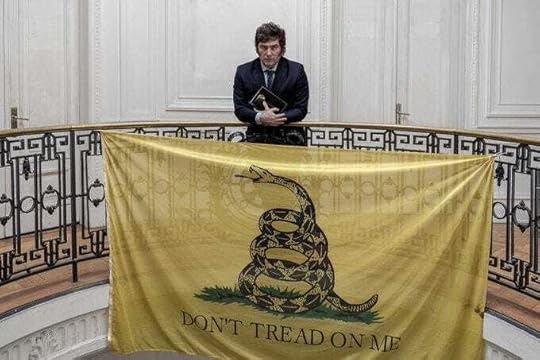
Milei also got a warm response from the markets, and from cryptocurrency leaders. All these people see Milei as one of them, or at least as someone who can benefit them financially. So if Milei is insane, his insanity is part of a wider social and political insanity. To put it more precisely, he is yet another freakish manifestation of the psychotic edge of neo-liberalism, where tech bros, millionaires, fascists, and white nationalists all swirl together in the same locust-like formations, eating away at divided, paranoid, and increasingly insecure democracies and proclaiming their sociopathic relish for liberal/leftist ‘tears’.
These are sado-movements that deliberately target minorities in order to win majorities; that attack migrants, asylum seekers and LGBT communities in order to convince these majorities that they are the ones under attack; that lie and twist the truth at every turn while doling out spoonfuls of snake oil, and always - always - ensuring that they and their backers get rich or richer.
Where Milei waved his chainsaw and promised to attack the political ‘caste’, millionaire sponsors were pouring money into his campaign, and one of them - the ex-president Macri - is well-placed to influence his government. This is what happens everytime, whether it applies to Brexit, Trump or Milei. In each case, supposedly insurgent right-wing movements declare war on fictious ‘liberal elites’, while some of the wealthiest men and institutions in their societies finance and support them. These revolutionaries promise to ‘drain the swamp’, even though they are the swamp. They promise to win back control and then take control. They promise to make their countries great, and help their buddies short the pound or fleece the no marks for fictitious border walls.
Whatever happens, they get the lucre, while their base gets the liberal tears and a chance to get one over on the feminazis. It’s gross, but they are gross.
Milei’s stunning victory is clearly drawn from various emotions with which so many countries have become depressingly familiar: disgust, anger and despair at an immovable and unresponsive political establishment; confusion, boredom, nihilism and desperation; status anxiety and toxic masculinity.
Movements like Milei’s ‘Freedom Advances’ party have learned how to use this combination to their advantage, and others have seen the advantages of putting their money into buffoonish snake-oil salesmen who offer the temporary satisfactions of political cruelty or simply entertainment. This is why the dog-men are always so well-financed, well-organised and increasingly, internationally-coordinated. And these entertainer-grifters will always benefit from a supine or supportive media that enables them to push their messages into the mainstream, and present themselves as legitimate contenders - not to mention their skilful use of digital technology and social media.
If Nigel Farage emerges from I’m A Celebrity with his profile enhanced, he will merely be one more person, like Milei or Trump, who has followed the dreary trajectory from reality tv star to political contender and paladin of the extreme-right/nationalist/libertarian swivel-eyed tendency. Whatever their differences, and regardless of their immediate prospects, men like Farage, Abascal, Milei, Bolsonaro, Trump and Wilders are all playing the same long game.
Behind their divisive culture wars, and contrived anti-woke and anti-globalist campaigns, lies a destructive and authoritarian agenda that is deeply and potentially irredeemably-damaging to the common good. Such men may not end democracy altogether. Most of them would undoubtedly prefer the Viktor Orban model of an authoritarian managed democracy, as long as it gives them what they want. But they will attempt to strip democracies across the world of any inability to effect any meaningful change, and the chaos, chauvinism, and hatred they have unleashed is laying the basis for something far worse than we have seen so far.
Anyone who doubts this should consider what Donald Trump proposes to do if he wins a second term. Mass deportations of millions of immigrants; the weaponisation of the criminal justice system against ‘Marxist’ prosecutors and lawyers who have crossed Trump in the past; the purging of all independent governmental institutions that he calls - echoing Milei - the ‘sick political class that hates our country’- these are only some of the steps that will accelerate America’s political decomposition from authoritarianism into something like fascism.
Such possibilities now stalk democracies everywhere. And this dangerous convergence has taken place at a perilous moment for humanity, when a wounded planet needs to be protected and repaired, for its sake and ours; when technological transformation threatens socioeconomic consequences affecting millions that we are only beginning to understand.
These are not the priorities of the dog-men. Their future is a sociopathic wilderness where the common good is only their good; where the individual is ‘sovereign ‘, and anything that impinges on that sovereignty is a ‘scam’ or ‘communism’; where the likes of Elon Musk and Peter Thiel, and other beneficiaries of the most insane and obscene accumulation of wealth in human history, seek to ride the dark politics of the twenty-first century for their own advantage.
Obviously we need to stop them. And that will require the broadest possible mobilisation, and the broadest coalitions possible - from the left and centre and even into mainstream conservatism. No time for sectarianism here. Nor do we need pale imitations in the hope of fending off the genuinely feral predators. Whatever you give these hellhounds, they will always want more.
We need governments that can stand up to them; that can act with humanity, vision, courage and principle for the greater good. We need educated voters who are able to tell the difference between the ersatz and the real, or at least between the decent and the indecent, and ensure that we get governments that meet these requirements.
Until we can do that, we will be all be at the mercy of the dog-men with chainsaws, who never should have been allowed to get this far in the first place.
November 21, 2023
The Peopleâs Swill

One thing about physical matter - and apologies to Uri Geller here - it won’t change just because you want it to change. Anyone who’s ever tried levitation or walking on water will know this. You might want things to be different. It would be nice to float up into the air in your pyjamas with a snowman, if it weren’t for pesky gravity. And walking on water - well who hasn’t want to do that? - but liquid just won’t harden.
The law works according to the same principle. Many of us might have been tempted to do things that the law doesn’t allow, but we don’t because we don’t want to be caught, and since we can’t change them, most of us accept them. And there’s another reason why we accept them: because the rule of law is something that everyone is, or should be, subject to, and because the laws that hold a society together, as imperfect and even unjust as some of them may be, should operate without interference from politicians and governments who might bend them to suit themselves or ignore them to suit themselves.
This doesn’t mean that every law is a good law. The 2023 Public Order Act, for example, is a malicious and brazenly-political piece of draconian legislation, aimed at limiting the democratic right to protest, which is putting peaceful protesters in jail for months and even years, while the government that introduced it refuses even to investigate alleged acts of financial fraud and malfeasance carried out during the pandemic.
But we’ve been here before. We’ve seen authoritarian governments passing authoritarian laws, and we’ve seen these laws (Section 28 comes to mind) overturned. Until the last few years, however, we had never seen a British government openly turning against the judges who interpret the law, simply in order to be able to do things that these judges have ruled against.
Thanks for reading Matt Carr’s Infernal Machine! Subscribe for free to receive new posts and support my work.
This takes us to the so-called Rwanda policy - the policy that the rotting corpse of the Tory party has been clinging onto, the way a vampire exposed to sunlight might suck on a fresh roadkill; the policy that the UK’s corrupt right-wing press never ceases to rage about.
There was a time when the Conservative party - and certainly a Conservative government - would have accepted the Supreme Court judgement, which ruled that its plan to deport migrants to Rwanda was unlawful. But those days are long gone. Now we live in a time when right-wing politicians and journalists yearn for Rwanda, the way better people in a better age once yearned for freedom and justice.
Where Martin Luther King dreamed of all humankind seated at the table of brotherhood, the British right dreams of detention centres thousands of miles away filled with the men, women, and children who dared to come to these shores in search of refuge. Where King broke bad laws through civil disobedience, the fallen idol Braverman and the angry politicians who took to the airwaves last week want to change good laws to realise their nightmare. Like Lee Anderson, and the toadie journalists who amplify their idiocies, they are prepared to do anything - anything - to achieve it. Just send the planes up into the sky, they growl, regardless of what the judges say, or what France says, or what foreigners of any kind have to say, and definitely regardless of what the law says.
Now these paragons of virtue have been thwarted once again, and like John Lee Hooker, they’re mad about it. Now can they lie awake at night, wrapped in the flag and gnashing their teeth in despair at the woke judges who continue to allow what Douglas Murray called ‘settlers’ into our generous but foolish country, and begging whoever will listen to please, please, please, let them get what they want.
As Morrissey once sang, It’s enough to make a good man turn bad, and he should know. And the more these patriots are thwarted, the more they cling onto that glorious vision: thousands upon thousands of migrants, dragged kicking and screaming from their luxury hotels and plasma tv sets, touching down at Kigali airport to have their asylum claims processed by the country we have so desperately and cravenly bribed to do this, in order to slip out of our legal and moral obligations.
Never mind that no one, literally no one, has ever come up with a smidgeon of evidence to suggest that the Rwanda policy will ‘work’ - insofar as working means stopping migrants coming here. There is no evidence that it would ‘break the smugglers’ business model.' No one has attempted to demonstrate how sending perhaps a thousand people at once to Rwanda would deter the thousands of people who have been crossing the Channel each year.
And yet the supporters of the policy don’t care. Like cargo cultists, they wait for John Frum to stop the boats, even he won’t. They believe what they want to believe, and many of them seem to have more interest in fighting for the policy than in the outcome. The stupidity of this borders on a kind of insanity. Why would any political party invest so much political capital in such a profoundly-flawed policy with very little prospect of implementation, let alone ‘success’?
Political messaging is one reason. The architects of the policy might claim they’re being cruel to be kind, but the reality is they’re being cruel to be cruel, in order to transmit an image of harsh intransigent ‘toughness’ to the people the government and the Tory party think will be impressed by this kind of thing.
Secondly, the policy is a classic wedge issue; it is designed to create and widen divisions, and polarise society along the faultlines that were opened by Brexit. To some extent, it is a continuation of Brexit by other means. After eight years, in which Brexit has yet to produce a single tangible benefit, its supporters have presented the Rwanda policy, as the one thing they can do, even if they can’t.
If Rwanda is another stick with which to beat the libtards and the wokeists who tried to ‘stop Brexit’, or simply refused to celebrate it, it’s also another manifestation of ‘sovereignty’ - in the sense of the ‘sovereign right to defend our borders’ etc. This framing makes it possible to pick new fights over the ECHR in search of the holy grail of pure Brexit, whilst also taking on the globalists’, the lefty-lawyers, bleeding-heart internationalists and all the other straw men the right wants to burn.
The Rwanda policy, according to its supporters, is also another expression of the ‘will of the people.’ Again and again, the politicians defending it suggest -without evidence, because some things are best left without evidence - that they are merely implementing the ‘will’ of the silent majority. Where Brexiters once depicted a narrow referendum result as an expression of the popular will, supporters of the Rwanda policy present it as another manifestation of the virtuous majority, thwarted by a corrupt and treacherous ‘elite.’
Swirling around the fringes of this toxic playing-field is the ‘great replacement theory’ - to which Braverman pandered before her smirking departure. Not for nothing was Nigel Farage the first person to draw attention to migrant boats back in 2020 - this is a shark who always scents political blood. Last but by no means least, the Rwanda policy is a colossal distraction from twelve years of calamitous Tory misrule, in which nemesis is coming, however timidly, in the form of Keir Starmer’s Labour party.
To call this unhealthy would be understating it considerably. But if these dishonourable deceivers can’t get their planes in the air, they always find a new level of low. In 2016, Tory politicians supported by the right-wing press, called the Supreme Court ‘enemies of the people’ because its judges ruled that the government would need parliamentary consent to trigger Article 50 and leave the European Union.

As we know, the right hated that. After all, why ‘win back’ sovereignty only for your government to submit its decisions to the sovereignty of an elected parliament? Was that what our ancestors fought for? And now, eight wretched years later, we find Brendan Clarke-Smith - a politician of nuclear bunker-level density - recycling the same headline on his Twitter feed in response to the Supreme Court’s Rwanda ruling:

In Brexitland its always deja vu all over again, and it needs to be, because otherwise people might start asking the questions that those who started it don’t want to answer. And so we are in Groundhog Day, with even Dominic Cummings slipping back into character and calling for a new fight to leave the ECHR.
Never mind that the Supreme Court’s decision was determined primarily by doubts concerning Rwanda’s commitment to the principle of non-refoulement (not returning refugees to a country where they might be at risk of harm or persecution) - a principle to which the UK is committed through various treaties, in addition to the ECHR.
More importantly, Rishi Sunak, a politician hovering perpetually between being and nothingness, and so devoid of passion and authenticity that he makes Keir Starmer look like Rob Roy, is proposing to pass ‘emergency legislation’ to get round the ruling, and declare Rwanda a ‘safe country.’ Reporting on that decision the yawning abyss-cum-court scribe known as Quentin Letts, dipped his purple pen into a bowl of unctuous gruel:
At last, ice-blue anger from this Prime Minister.
He's slow to rage, Rishi Sunak, but there was a cold curtness about him when he gave a news conference about the Supreme Court's latest extraordinary interdiction of the public will.
'Let me tell everyone now,' he snarled, 'I will not allow a foreign court to block these flights.' He was referring not to the Supreme Court – does being on another planet count as 'foreign'? – but to judges in Strasbourg, home of the European Court of Human Rights.
They stopped Rwanda flights from leaving British soil.
This is straight from the ‘enemies of the people’ playbook, and if you had any doubts about what roused Head Boy Sunak from his banal stupor, Letts was there to remove them, with this vignette:
He almost spat the words. Those dark eyes, normally gooey, blazed like two lumps of hot coal. Not that we're allowed coal any more. Bloody activists even stopped that.
Leave aside Sunak’s ice-blue anger, cold curtness and blazing gooey eyes for a moment, consider what our hot-blooded scribe had to say about the poor old judges:
The judiciary's lordliest old boobies had sided with UN campaigners rather than their own country's ministers…There were countless robed orderlies and high-backed swivel chairs for the judges, Milords Reed, Hodge and Lloyd-Jones. Three buzzards on a gibbet.
The bad writing is one thing, but the ‘judges-versus-the-people’ sentiments are far worse. Faced with another unfavourable judgement from the final appeal court in the UK, Sunak tweeting that he was ‘taking the extraordinary step of introducing emergency legislation to confirm Rwanda is safe. I will not allow a foreign court, like the European Court of Human Rights, to block these flights.’
No point suggesting to our incandescent Prince Hal that doing this is likely to be as effective as passing a law confirming that Pentonville jail is actually Centreparcs. You can repeat till you’re blue in the face: The. ECHR. Did. Not. Block. These. Flights.
That’s not the game this government, or this party, or the right-wing press is playing. They are gambling, but facts are not their currency. Attacking the Supreme Court may seem like a small bet, amid the great splurge of the last eight years, but there is reason behind it, even if that reason is not decent.
This is Brexit-meets-MAGA. It is, to use Letts’s words, a gooey-flirtation with the worst kind of populism: the kind where ‘populism’ slides towards pre-fascism; where presidents refuse to accept that they have lost elections; where governments refuse to accept legal rulings that they don’t like; and institutions intended to check the power of the executive are swatted away by the executive in the name of the people.
Sunak’s gambit may be doomed. There are so many hurdles to his ‘emergency legislation’ that can bring it down. Even if it gets passed, pesky political reality will still be out there. Rwanda will still be what it is. International treaties will still be what they are, and nothing Global Britain can do or say can change that, short of passing emergency legislation removing itself from the world completely.
But as with Brexit, and with so much else, it’s not the outcome, it’s the process that matters here. It’s the division, the cruelty, the endless fight and the endless distraction.
It’s the swill of the people, and that’s the drink that Sunak and the gimlet-eyed pitchfork mob that the Tory party has become are drinking, and they want everyone else to drink it too.
The People’s Swill

One thing about physical matter - and apologies to Uri Geller here - it won’t change just because you want to change. Anyone who’s ever tried levitation or walking on water will know this. You might want things to be different. It would be nice to float up into the air in your pyjamas with a snowman, if it weren’t for pesky gravity. And walking on water - well who hasn’t want to do that? - but liquid just won’t harden.
The law works according to the same principle. Many of us might have been tempted to do things that the law doesn’t allow, but we don’t because we don’t want to be caught, and since we can’t change them, most of us accept them. And there’s another reason why we accept them: because the rule of law is something that everyone is, or should be, subject to, and because the laws that hold a society together, as imperfect and even unjust as some of them may be, should operate without interference from politicians and governments who might bend them to suit themselves or ignore them to suit themselves.
This doesn’t mean that every law is a good law. The 2023 Public Order Act, for example, is a malicious and brazenly-political piece of draconian legislation, aimed at limiting the democratic right to protest, which is putting peaceful protesters in jail for months and even years, while the government that introduced it refuses even to investigate alleged acts of financial fraud and malfeasance carried out during the pandemic.
But we’ve been here before. We’ve seen authoritarian governments passing authoritarian laws, and we’ve seen these laws (Section 28 comes to mind) overturned. Until the last few years, however, we had never seen a British government openly turning against the judges who interpret the law, simply in order to be able to do things that these judges have ruled against.
Thanks for reading Matt Carr’s Infernal Machine! Subscribe for free to receive new posts and support my work.
This takes us to the so-called Rwanda policy - the policy that the rotting corpse of the Tory party has been clinging onto, the way a vampire exposed to sunlight might suck on a fresh roadkill; the policy that the UK’s corrupt right-wing press never ceases to rage about.
There was a time when the Conservative party - and certainly a Conservative government - would have accepted the Supreme Court judgement, which ruled that its plan to deport migrants to Rwanda was unlawful. But those days are long gone. Now we live in a time when right-wing politicians and journalists yearn for Rwanda, the way better people in a better age once yearned for freedom and justice.
Where Martin Luther King dreamed of all humankind seated at the table of brotherhood, the British right dreams of detention centres thousands of miles away filled with the men, women, and children who dared to come to these shores in search of refuge. Where King broke bad laws through civil disobedience, the fallen idol Braverman and the angry politicians who took to the airwaves last week want to change good laws to realise their nightmare. Like Lee Anderson, and the toadie journalists who amplify their idiocies, they are prepared to do anything - anything - to achieve it. Just send the planes up into the sky, they growl, regardless of what the judges say, or what France says, or what foreigners of any kind have to say, and definitely regardless of what the law says.
Now these paragons of virtue have been thwarted once again, and like John Lee Hooker, they’re mad about it. Now can they lie awake at night, wrapped in the flag and gnashing their teeth in despair at the woke judges who continue to allow what Douglas Murray called ‘settlers’ into our generous but foolish country, and begging whoever will listen to please, please, please, help them get what they want.
As a Morrissey once sang, It’s enough to make a good man turn bad, and he should know. And the more these patriots are thwarted, the more they cling onto that glorious vision: thousands upon thousands of migrants, dragged kicking and screaming from their luxury hotels and plasma tv sets, touching down at Kigali airport to have their asylum claims processed by the country we have so desperately and cravenly bribed to do this, in order to slip out of our legal and moral obligations.
Never mind that no one, literally no one, has ever come up with a smidgeon of evidence to suggest that the Rwanda policy will ‘work’ - insofar as working means stopping migrants coming here. There is no evidence that it would ‘break the smugglers’ business model.' No one has attempted to demonstrate how sending perhaps a thousand people at once to Rwanda would deter the thousands of people who have been crossing the Channel each year.
And yet the supporters of the policy don’t care. Like cargo cultists, they wait for John Frum to stop the boats, even he won’t. They believe what they want to believe, and many of them seem to have more interest in fighting for the policy than in the outcome. The stupidity of this borders on a kind of insanity. Why would any political party invest so much political capital in such a profoundly-flawed policy with very little prospect of implementation, let alone ‘success’?
Political messaging is one reason. The architects of the policy might claim they’re being cruel to be kind, but the reality is they’re being cruel to be cruel, in order to transmit an image of harsh intransigent ‘toughness’ to the people the government and the Tory party think will be impressed by this kind of thing.
Secondly, the policy is a classic wedge issue; it is designed to create and widen divisions, and polarise society along the faultlines that were opened by Brexit. To some extent, it is a continuation of Brexit by other means. After eight years, in which Brexit has yet to produce a single tangible benefit, its supporters have presented the Rwanda policy, as the one thing they can do, even if they can’t.
If Rwanda is another stick with which to beat the libtards and the wokeists who tried to ‘stop Brexit’, or simply refused to celebrate it, it’s also another manifestation of ‘sovereignty’ - in the sense of the ‘sovereign right to defend our borders’ etc. This framing makes it possible to pick new fights over the ECHR in search of the holy grail of pure Brexit, whilst also taking on the globalists’, the lefty-lawyers, bleeding-heart internationalists and all the other straw men the right wants to burn.
The Rwanda policy, according to its supporters, is also another expression of the ‘will of the people.’ Again and again, the politicians defending it suggest -without evidence, because some things are best left without evidence - that they are merely implementing the ‘will’ of the silent majority. Where Brexiters once depicted a narrow referendum result as an expression of the popular will, supporters of the Rwanda policy present it as another manifestation of the virtuous majority, thwarted by a corrupt and treacherous ‘elite.’
Swirling around the fringes of this toxic playing-field is the ‘great replacement theory’ - to which Braverman pandered before her smirking departure. Not for nothing was Nigel Farage the first person to draw attention to migrant boats back in 2020 - this is a shark who always scents political blood. Last but by no means least, the Rwanda policy is a colossal distraction from twelve years of calamitous Tory misrule, in which nemesis is coming, however timidly, in the form of Keir Starmer’s Labour party.
To call this unhealthy would be understating it considerably. But if these dishonourable deceivers can’t get their planes in the air, they always find a new level of low. In 2016, Tory politicians supported by the right-wing press, called the Supreme Court ‘enemies of the people’ because its judges ruled that the government would need parliamentary consent to trigger Article 50 and leave the European Union.

As we know, the right hated that. After all, why ‘win back’ sovereignty only for your government to submit its decisions to the sovereignty of an elected parliament? Was that what our ancestors fought for? And now, eight wretched years later, we find Brendan Clarke-Smith - a politician of nuclear bunker-level density - recycling the same headline on his Twitter feed in response to the Supreme Court’s Rwanda ruling:

In Brexitland its always deja vu all over again, and it needs to be, because otherwise people might start asking the questions that those who started it don’t want to answer. And so we are in Groundhog Day, with even Dominic Cummings slipping back into character and calling for a new fight to leave the ECHR.
Never mind that the Supreme Court’s decision was determined primarily by doubts concerning Rwanda’s commitment to the principle of non-refoulement (not returning refugees to a country where they might be at risk of harm or persecution) - a principle to which the UK is committed through various treaties, in addition to the ECHR.
More importantly, Rishi Sunak, a politician hovering perpetually between being and nothingness, and so devoid of passion and authenticity that he makes Keir Starmer look like Rob Roy, is proposing to pass ‘emergency legislation’ to get round the ruling, and declare Rwanda a ‘safe country.’ Reporting on that decision the yawning abyss-cum-court scribe known as Quentin Letts, dipped his purple pen into a bowl of unctuous gruel:
At last, ice-blue anger from this Prime Minister.
He's slow to rage, Rishi Sunak, but there was a cold curtness about him when he gave a news conference about the Supreme Court's latest extraordinary interdiction of the public will.
'Let me tell everyone now,' he snarled, 'I will not allow a foreign court to block these flights.' He was referring not to the Supreme Court – does being on another planet count as 'foreign'? – but to judges in Strasbourg, home of the European Court of Human Rights.
They stopped Rwanda flights from leaving British soil.
This is straight from the ‘enemies of the people’ playbook, and if you had any doubts about what roused Head Boy Sunak from his banal stupor, Letts was there to remove them, with this vignette:
He almost spat the words. Those dark eyes, normally gooey, blazed like two lumps of hot coal. Not that we're allowed coal any more. Bloody activists even stopped that.
Leave aside Sunak’s ice-blue anger, cold curtness and blazing gooey eyes for a moment, consider what our hot-blooded scribe had to say about the poor old judges:
The judiciary's lordliest old boobies had sided with UN campaigners rather than their own country's ministers…There were countless robed orderlies and high-backed swivel chairs for the judges, Milords Reed, Hodge and Lloyd-Jones. Three buzzards on a gibbet.
The bad writing is one thing, but the ‘judges-versus-the-people’ sentiments are far worse. Faced with another unfavourable judgement from the final appeal court in the UK, Sunak tweeting that he was ‘taking the extraordinary step of introducing emergency legislation to confirm Rwanda is safe. I will not allow a foreign court, like the European Court of Human Rights, to block these flights.’
No point suggesting to our incandescent Prince Hal that doing this is likely to be as effective as passing a law confirming that Pentonville jail is actually Centreparcs. You can repeat till you’re blue in the face: The. ECHR. Did. Not. Block. These. Flights.
That’s not the game this government, or this party, or the right-wing press is playing. They are gambling, but facts are not their currency. Attacking the Supreme Court may seem like a small bet, amid the great splurge of the last eight years, but there is reason behind it, even if that reason is not decent.
This is Brexit-meets-MAGA. It is, to use Letts’s words, a gooey-flirtation with the worst kind of populism: the kind where ‘populism’ slides towards pre-fascism; where presidents refuse to accept that they have lost elections; where governments refuse to accept legal rulings that they don’t like; and institutions intended to check the power of the executive are swatted away by the executive in the name of the people.
Sunak’s gambit may be doomed. There are so many hurdles to his ‘emergency legislation’ that can bring it down. Even if it gets passed, pesky political reality will still be out there. Rwanda will still be what it is. International treaties will still be what they are, and nothing Global Britain can do or say can change that, short of passing emergency legislation removing itself from the world completely.
But as with Brexit, and with so much else, it’s not the outcome, it’s the process that matters here. It’s the division, the cruelty, the endless fight and the endless distraction.
It’s the swill of the people, and that’s the drink that Sunak and the gimlet-eyed pitchfork mob that the Tory party has become are drinking, and they want everyone else to drink it too.
November 14, 2023
Braverland

Every writer has failures and projects that don’t make the cut, and most of the time we just have to take it on the chin and move on. But I can’t resist sharing with you my rejected series Braverland, which I have submitted to numerous television companies, and also to Netflix, to universally negative responses. Of course, I knew that this was a risky project; even in a country locked into what even seems to be a permanent state of manufactured political melodramas, there’s not much appetite for dystopian state-of-the-nation political drama with a satirical edge.
But sometimes you just have to do what you have do. And I thought I had a pretty good spec script for a pilot episode which I called ‘Remembrance Day’. My aim was to build the series around one central character - a politically unscrupulous conservative politician with sociopathic tendencies and no moral compass beyond their own narcissism and ambition.
Yes I know you’re thinking Alan B’stard all over again, but wait. Because my protagonist is female, and she has made her career by pandering to the most extreme right wing elements of a decayed and hollowed-out party in the hope that this will give her the power and importance she’s always craved.
She’s a kind of British Trump; prepared to say anything, no matter how divisive, dangerous, ignorant, dishonest or inflammatory in order to advance herself, in the name of what she calls ‘the silent majority.’ I called my character ‘Suella Braverman’, and - extra twist - she’s the daughter of immigrants! And she also happens to be a Home Secretary notorious for her cruelty towards ‘illegal immigrants’ - a neat premise on my part, I thought.
I gave my character some pungent backstory: She’s a member of the Brexit extremist European Research Group. A former Attorney General. She’s herself photographed laughing outside a migrant detention centre in Rwanda. She says that homelessness is a ‘lifestyle choice.’ She calls pro-Palestinian protestors calling for a ceasefire ‘hate marchers.’ She says that Pakistani men ‘hold cultural values at odds with British values’ - it’s edgy, I know.
Thanks for reading Matt Carr’s Infernal Machine! Subscribe for free to receive new posts and support my work.
That was the basis of my first rejection - from a reader who refused to read the rest because, according to him, no one like this could ever occupy such a crucial and famously difficult office of state in a country like ours. Even dystopian satires, I was told, have to have some connection to real possibilities. And that was before I really got into my stride.
My scenario unfolds at a tense time in our national history. The Gaza war has opened deep divisions within society, inflaming tensions to the point when Jews and Muslims are feeling vulnerable and under threat. For weeks, tens of thousands of people have been marching in protest at the shocking devastation in Gaza and calling for a ceasefire. Now the organizers of the ceasefire movement call for another protest on Armistice Day.
Times like these that require wise and thoughtful statesmen and stateswomen, who know to chose their words carefully. But in my plot we have a Conservative party and a rightwing media that always seeks to make a bad thing worse. And so its members and supporters immediately seize on the protest, accusing its organisers of ‘disrespecting’ our war dead, and preparing to attack and deface the Cenotaph. There are calls for the police to cancel the march, because of ‘rising fears of violence’ - even though there is no evidence that that the marchers are planning any violence, or even intend to go anywhere near the Cenotaph.
Naturally the Daily Mail leads the charge:

In the same issue, a columnist called ‘Sarah Vine’ delivers a remarkably condescending message to the ‘ignorant snowflakes’ of her children’s generation, to ‘Educate yourselves. Stop scrolling. Read a history book. And, above all, keep your hands off our heroes this Remembrance weekend.’
Waiting for the BarbariansIn the midst of this, my Braverman character writes an incendiary piece in the Times attacking the ceasefire marchers once again, in which she accuses the police of favouring BLM protesters over ‘lockdown protesters’ and pandering to the Gaza ceasefire protest marchers. Not for the first time, my character calls them ‘hate marchers’, who she compares to ‘the kind we are more used to seeing in Northern Ireland.’
What’s this? one smartass producer asked me. A Conservative Home Secretary on the extreme right of the party attacking the Orangemen? Never going to happen.
Fine. My bad, so I suggested that she was actually referring to ‘dissident republicans.’ And when was the last time dissident republicans marched with the approval of the police? the producer asked (why are these metropolitan elitists sooo picky?).
I defended my character as follows. We’re in a near-future dystopia. My Home Secretary is basically calling the police ‘woke’. She is suggesting that extreme-right protesters receive preferential treatment in comparison with the left - a well-worn rightwing victimhood trope. She is attempting to undermine the Metropolitan police chief ‘Mark Rowley’, who refuses to bow to political pressure and ban the Gaza march - even the Prime Minister, who I call ‘Rishi Sunak’ has suggested that such a march on Armistice Day would be ‘disrespectful.’
Well everyone knows how famously leftwing the Met are. So I had what I thought were some striking and well-written scenes here, and I wasn’t pleased to be told in no uncertain terms that none of this could never happen. No one accepted my big reveal, in which it turns out that ‘Braverman’ had submitted her article for prime ministerial approval only to be told to make some changes. But she then published it anyway, without including the suggestions from 10 Downing Street - a slap in the face and a ‘sack me if you dare’ challenge for ‘Rishi Sunak’.
Anyone who did this would be SACKED, I was told - all right, no need for the capitals, ok? I get it. But in my scenario, she isn’t, because the PM simply doesn’t dare - or so it seems.
And ‘Suella Braverman’ isn’t only one whose looking to defend ‘our heroes’ from the Gaza hate marchers. On Twitter, an Israeli propagandist called ‘Douglas Murray’ rages against the ‘UK Hamas supporters’ planning ‘a "million man march" on Remembrance Day’. On the basis of no evidence whatsoever, Murray warns that the protesters ‘plan to defame our war-dead and desecrate the Cenotaph itself.’ This, he says, must surely be the ‘ tipping point,’ and ‘if such a march goes ahead then the people of Britain must come out and stop these barbarians.’
Strong words, from a humane and humble man who embodies the finest achievements of our civilisation - or is it race? And there is no shortage of patriots willing to heed these calls. The Democratic Football Lads Alliance promises to prevent protesters from trying to ‘desecrate and disrespect our monuments’ and act as a ‘buffer’, so that veterans and patriots can pay their respects at the Cenotaph. Others call for ‘resistance’ on behalf of the ‘silent majority’, in order to prevent the desecration of their ‘sacred day.’
Who would possibly think that calling for a ceasefire constitutes a ‘desecration’? asked one of my readers. Wasn’t I in danger of overdoing it? Honestly, do you have to explain to these people that dystopia means ‘bad place’, even the ‘worst possible place’? Haven’t they seen The Hunger Games?
Elsewhere, a character I call ‘Tommy Robinson’ aka Stephen Yaxley-Lennon, also known as CokeBoy Dim - newly-restored to Twitter thanks to the benign stewardship of Elon Musk - issues a video, calling on ‘ British men’ to come to London to ‘show our Government and show our police and show Hamas and everyone sitting around the world saying “Britain has fallen” that there is a resistance."
It’s stirring stuff, enough to bring a lump to the throat of anyone who’s seen Frozen. But sometimes a picture is worth a thousand patriotic words, and throughout the week leading up to Remembrance Weekend, a procession of goofy-looking Tory MPs posed for what looks like a series of stills from a Gardener’s Question Time episode on how to grow artificial poppies using your own bullshit as fertiliser.


Of course some of my readers reminded me that we are a serious country, and said that such behaviour is too patently fake and mawkish to be credible, and that no Tory politician would sink so low as to use our war dead to boost their own profile. To which I can only repeat: this is dys-top-ia. It’s sat-ire.
Anyway, whatever you think of that premise, there is no doubt that the barbarian hate marchers are coming to trample on our war dead and perhaps boil their bones into soup. Never mind that a former British general, an admiral, and the British legion all insist that the march should go ahead. The right knows what it knows, and is not interested in anything else, so much so that even ‘Rishi Sunak’ warns ‘Mark Rowley’ that he will hold him ‘accountable’ - something he has singularly failed to do with ‘Suella Braverman’ - if the protest kicks off.
All week it goes on like this: the right works itself into a fit of frothing righteous indignation and civilisation terror at the coming sacrilege; the ghosts of the Somme rise up from the green fields of France; Churchill’s bust frowns, and a sigh is heard from from the statue of the unknown soldier. There are dire warnings that poppy sellers have been attacked by Gaza protesters for selling poppies, to the point when no one dares sell them anymore, because this is the kind of thing that barbarians (aka Muslims) do.

Never mind that the woke British Transport Police and woke police and the woke British legion deny that such attacks have taken place and insist that poppies are being sold as normal. As Nadine Dorries would say, they would, wouldn’t they? This is why ‘Rishi Sunak’ declares himself ‘appalled’ that poppy sellers, including ‘many veterans who are the heart of our collective remembrance each year’ have experienced ‘intimidation and abuse’ - even though they haven’t.
Once again, I’m told by one metropolitan gatekeepers - with the capitals again - that nothing like this could ever EVER happen. Anyway, in my pilot, the day finally dawns - Armistice Day - the day when we remember all those who fought to preserve our freedoms. The nation holds its breath in the autumn sunshine, anticipating the barbarian hordes who will come to tear poppies from the ground, to dig up the bones of the war dead, to paint on Churchill’s face and adorn the Cenotaph with Palestinian flags and calls for jihad.
From across the country hundreds of thousands of protesters converge on the capital - maybe between 300,000 to 800,000 - and, apart from some jostling of Michael Gove later, and a few abhorrent banners and placards - STOP using Swastika/Star of David cartoons…nothing happens. The march passes off peacefully and goes nowhere near the Cenotaph.
The protesters even hold a two-minute silence to commemorate the victims of all wars, including Gaza. But the Cenotaph does get attacked. Hundreds of far-right ‘counter-protesters’ try to ‘defend’ it, even though the Cenotaph is already being defended by police. Unwilling to put their trust in the woke pinko Met - and as Nadine Dorries would say, who can blame them? - these brave sons of the English soil attack the police.
Nine police officers are injured. Two of them end up in hospital. Nearly a hundred ‘counter-protesters’ are arrested. Pissed up mobs chant ‘England till I die’ and bray at the police ‘you’re not English anymore’ and ‘why us, not them?’ Some give Nazi salutes. The patriots have turned up and they look a lot like the barbarians we were warned about.
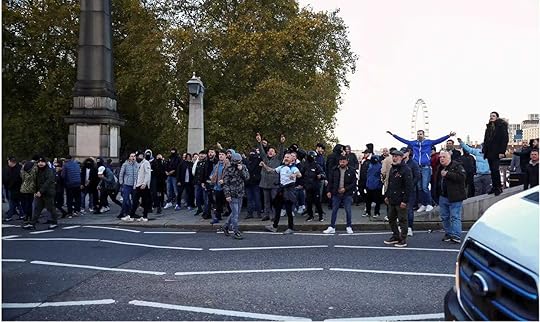
At some point, ‘Tommy Robinson’ abandons the scene in a taxi emblazoned with gay pride colours. This was the point where I was told, in no uncertain terms, that I had lost the plot.
So for all these reasons, my pilot was scrapped. And now, it will never be seen: my dystopian tale of a gaslit nation; of political extremism and ‘radicalization’, encouraged and emboldened by the Home Secretary, the Prime Minister, the rightwing press, and a host of dubious actors on social media; of a country in free-fall where integrity, honesty, and even the most elementary concept of public duty are absent from a government and a Tory party in a death-spiral; a moral collapse which is most brazenly-embodied in the Home Secretary.
Now I will never get to do the follow-up, in which the same people who deliberately inflamed tensions throughout the past week are now rowing back from it, or attempting to distract from what they said and from what ‘Suella Braverman’ said, about the riot they hoped for but didn’t get. You can imagine what the Mail would have said if pro-Palestinian protesters had attacked the Cenotaph and injured nine police officers. But it didn’t get that, and in my pilot, we got this:

Those episodes must also vanish, along with the tweet in which ‘Suella Braverman’ praises the police for defending the Cenotaph against the ‘counter-protesters’ she incited, which doesn’t save her from being sacked. Now you won’t see the episode in which - wait for it - a former Prime Minister named ‘David Cameron’ is brought back as Foreign Secretary.
Of course I can hear the know-it-all tv script readers say that no prime minister in his right mind would bring back a man who a parliamentary committee blamed for the failed Libya ‘intervention’, not to mention the hapless facilitator of Brexit - the worst foreign policy disaster in British history. Who, you can hear them ask, would do that, at a time when the country is waging an indirect war with Russia, and complicit in the destruction of Gaza?
No point in trying to make them suspend disbelief and accept that the same prime minister has appointed Esther McVey as (drum roll) Minister for Common Sense. Are we a joke country? You can hear them say.
So all those weeks of imaginative labour have gone down the drain. And now I’ll just have to get back to the drawing-board, and see if I can think of something more plausible, and you’ll just have to imagine what Braverland might have looked like, if we were living in dys-top-ia.
Thanks for reading Matt Carr’s Infernal Machine! Subscribe for free to receive new posts and support my work.
November 7, 2023
Just Talk: A Tale of Two (Non) Ceasefires
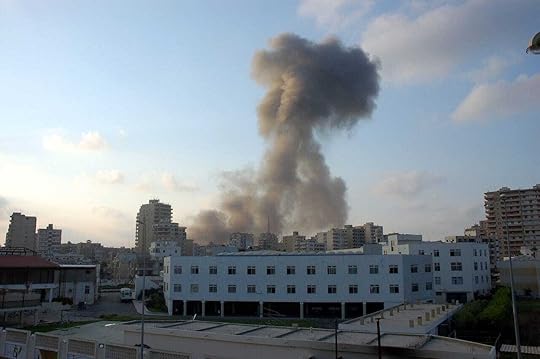
Seventeen years ago, at the G8 Summit in St Petersburg on 17 July, 2006, the outside world inadvertently found itself eavesdropping on a conversation between two of the most powerful men in the world. The conversation took place during a lull in the summit, when Tony Blair and George Bush were overheard discussing the war in Lebanon between Israel and Hezbollah, because a mic had accidentally been left on.
The war was then into its fifth day, and Blair and Bush were discussing what they clearly regarded as an unwelcome possibility that UN Secretary General Kofi Annan might be about to call for a ceasefire. This resulted in the following exchange:
Thanks for reading Matt Carr’s Infernal Machine! Subscribe for free to receive new posts and support my work.
Blair I don't know what you guys have talked about, but as I say I am perfectly happy to try and see what the lie of the land is, but you need that done quickly because otherwise it will spiral.
Bush I think Condi [US Secretary of State Condoleeza Rice] is going to go pretty soon.
Blair But that's, that's, that's all that matters. But if you ... you see it will take some time to get that together.
Bush Yeah, yeah.
Blair But at least it gives people ...
Bush It's a process, I agree. I told her your offer to ...
Blair Well ... it's only if I mean ... you know. If she's got a ... or if she needs the ground prepared as it were ... Because obviously if she goes out, she's got to succeed, as it were, whereas I can go out and just talk.
Bush You see, the ... thing is what they need to do is to get Syria, to get Hizbullah to stop doing this shit and it's over.
Blair Syria.
Bush Why?
Blair Because I think this is all part of the same thing
At the time the British press focused on the frat boy greeting ‘Yo Blair’ that Bush used to attract Blair’s attention, rather than his astonishingly cynical proposal to go to the Middle East and pretend to be a peace envoy, in order to extend the war.
Blair never got the opportunity to go to the Middle East and ‘just talk’. On 20 July, Kofi Annan called for a ceasefire in a speech to the United Nations Security Council. On 25 July Condoleeza Rice visited Lebanon and Jerusalem, where she and Prime Minister Ehud Olmert rejected a cease-fire if it left Hezbollah in control of southern Lebanon.
When the war finally ended with a ceasefire on 14 August, Hezbollah was still in control of south Lebanon. By that time, Israel had carried out seven thousand airstrikes across the whole of Lebanon, against an array of targets that included airports, bridges, electrical facilities, ports, supermarkets, water treatment plants, gas stations, and residential areas, including the Dahiya district in Beirut - a Hezbollah stronghold.
In a 2008 policy paper, the Israeli general Gadi Eizenhot described what he called the ‘Dahiya doctrine’ as a template for future operations:
What happened in the Dahiya Quarter of Beirut in 2006, will happen in every village from which shots are fired on Israel. We will use disproportionate force against it and we will cause immense damage and destruction. From our point of view these are not civilian villages but military bases.
This ‘doctrine’ was clear at the time, and its military objective was also clear: to turn the Lebanese government and population against Hezbollah by visiting war on the whole population. In his memoirs, Blair claims that the G8 Summit initially believed that ‘Hizbullah had it coming’, before ‘European opinion quickly solidified around the demand that the Israelis should stop’.
Blair, however, felt ‘it was wrong that there should be a unilateral cessation. It should be on both sides, and we couldn't expect Israel to stop unless the rockets stopped. But that was not how it seemed to most people.’
Not for the first time, Blair was being economical with the truth. A ceasefire cannot be a ceasefire if it is unilateral, and no one expected that. In his Security Council speech Kofi Annan criticized both Hezbollah’s ‘provocative attack’ on 12 July and the ‘excessive violence’ of Israel’s response to it.’ The eventual ceasefire on 14 August was agreed on by both sides.
Blair later acknowledged that the Israeli response was ‘at one level disproportionate’, and agreed that ‘ the deaths of so many innocent civilians, especially children, were completely wrong and unacceptable’. He also asked
how many families would mourn, how much bitterness would be generated, and how if you were an ordinary Lebanese caught up in this nightmare, you would just want to rage against the world. But I also worried about the risk of a Hezbollah ‘victory’, of a situation where they could calculate the provocation, pull Israel into retaliation and emerge as winners. I felt a unilateral cessation gave them that. I felt anything which left them in any doubt as to the calculation of risk next time round was a real and possible future threat.
Blair accepted Israel’s assessment of the ‘calculation of risk’, albeit with a heavy heart and much handwringing. And his proposal to go to the Middle East and ‘just talk’ was intended to give Israel time to continue its ‘disproportionate’ response. Blair later came to believe that this stance did him ‘more damage than anything since Iraq,’ and galvanised his backbenchers into pressuring him into leaving Downing Street.
All of which brings us to the current Labour leadership’s spectacularly inadequate response to the devastating violence in the Gaza Strip. As someone who - like millions of others - desperately wants to see the end of these terrible years of Tory misrule before society collapses altogether, even if a rightwing Labour government is the only viable option, it is deeply depressing to see the Labour leadership exhibiting the same cynicism that Blair showed seventeen years ago.
The circumstances are obviously different. Hamas’s savage pogrom/assault on 7 October was a far greater ‘provocation’ than Hezbollah’s border skirmish in 2006, and the Israeli response in Gaza has already caused a higher civilian death toll than in Lebanon, and may yet outstrip the casualties in any of Israel’s wars.
And yet it is astonishing how bad Labour have been in the face of these calamitous events. Until 7 October, Starmer and his team had been inching towards power, like participants in a game of Grandmother’s Footsteps, freezing whenever the government or a rightwing paper turned round and looked at them. It was hardly inspiring, but it had established Labour as a credible government, as the Tories continued to scrape new layers from the bottom of its own barrel. Starmer achieved this through a carefully-constructed veneer of grey-suited managerial competence that made even disillusioned Tory voters consider Labour as a viable option to their trainwreck government.
But there some issues that require political courage and principle, not managerialism, and the war in Gaza is one of them. And throughout the last horrifying few weeks, Starmer and his team have shown themselves to be as cowardly, unprincipled, and complicit in the catastrophe that is now unfolding as the government they hope to replace.
Asked on 11 October, whether Israel had the right to cut off water and fuel to Palestinian civilians, Starmer replied that it did, while also insisting that ‘everything should be done within international law’. But Article 54 of Additional Protocol 1 of the 1977 Geneva Convention, clearly states
It is prohibited to attack, destroy, remove, or render useless objects indispensable to the survival of the civilian population, such as foodstuffs, agricultural areas for the production of foodstuffs, crops, livestock, drinking water installations and supplies, and irrigation works, for the specific purpose of denying them for their sustenance value to the civilian population or to the adverse Party, whatever the motive, whether in order to starve out civilians, to cause them to move away, or for any other motive.
International law also imposes specific obligations on the occupying power to protect the civilian population, and contrary to the way the situation in Gaza has often been portrayed, Israel still is the occupying power. At the most basic humanitarian level therefore, Starmer could have reiterated these obligations and insisted that Israel meet them. But it wasn’t until he faced mass resignations from Labour councils and criticisms from his own MPs, and realised that Labour might lose crucial votes, that he began to deny that he had said what he had said, and re-emphasize his commitment to international law.
Throughout these slippery twists and turns, Starmer has consistently rejected a ceasefire in much the same terms that Blair once did. In a speech to Chatham House he claimed that a ceasefire was not the ‘correct position’ because it would ‘freeze hostilities’ and therefore ‘embolden Hamas’ to carry out more attacks.
His team has followed the same template: condemn Hamas; lament Palestinian casualties, but blame them on Hamas; issue vague calls on Israel to observe international law while refusing to condemn Israel for any specific breaches of international law; call for humanitarian aid while refusing to condemn Israel for making it all but impossible to get humanitarian aid into the Gaza Strip.
All these ingredients were present in a dreadful article by David Lammy in the Observer on Sunday, that could have been written by Blair in 2006:
I understand why so many are calling for a ceasefire now. We all want the bloodshed and suffering to end. But a ceasefire now would just embolden Hamas. They would still hold hundreds of innocent hostages. They would still fire rockets into Israel. And they would still have the capacity and determination to repeat the horrors of 7 October “again and again”, as a Hamas official boasted last week.
Like all those who make these points, Lammy fails to explain how the ‘bloodshed and suffering’ can stop without a ceasefire, or how these operations will free the hostages, or what the ultimate endgame of these operations is, or who will govern Gaza if Hamas is ‘destroyed.'
As for ‘emboldening’ Hamas, the belligerent statement by one Hamas official cannot be a justification for Israeli operations that have already gone way beyond any conventional understanding of military necessity. In Lebanon, Israel used the same persistent and dehumanising references to ‘terror operatives’, or terrorist ‘hubs’ and ‘infrastructure’ in order to justify an assault on the civilian population. Yet Labour politicians have accepted these terms, and continued to blame the Palestinian death toll on Hamas, or described it as a tragic and inevitable consequence of war.
David Blunkett - no surprise here - has accused Labour MPs calling for a ceasefire, of engaging in childish ‘gestures’ to ‘make themselves feel better.’ In a visit to UNRWA offices in Cairo, Lammy and Lisa Nandy could not even acknowledge that 70 UNRWA casualties in Gaza had been killed by Israel. Instead they were merely ‘tragic deaths’.
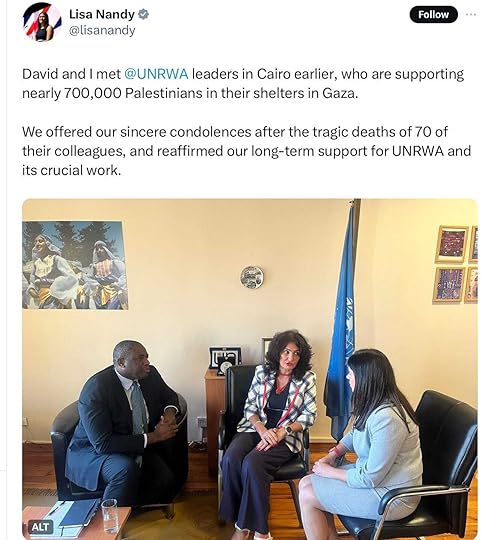
At times the cowardice of Labour frontbenchers has been breathtaking. Here is Nandy, with her trademark ‘concerned person’ frown, refusing to tell Victoria Derbyshire whether Israel has violating international law because to do that would be ‘grandstanding.’
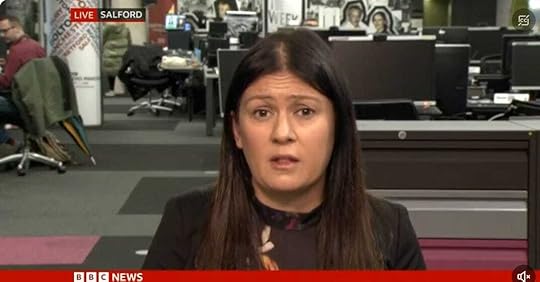
Such contortions are painful to watch. Polly Toynbee and others have urged the Labour Party not to tear itself apart over Gaza, and Toynbee has criticised the party’s critics, on the grounds that Labour doesn’t have the power to change the situation on the ground. But this is a flimsy distraction. No one, not even Biden, has that power, by themselves alone. But that powerlessness should not stop the main opposition party and potential future government from adopting a principled position, and sticking to it.
No one expects anything close to that from this shambles of a government. But it matters when the main opposition party, in the country more responsible than any other for the Palestinian tragedy, wrings its hands and does nothing, while a key ally kills ten thousand Palestinians in a month. It matters when Labour demands that Israel doesn’t breach international law as a generic position, without actually daring to say specifically if it actually has breached international law.
There are many reasons why Labour behaves like this; the funding it receives from pro-Israel organisations and individuals; its paralysis in the face of criticisms that equate support for the Palestinian cause with antisemitism; Zionist sympathies within the party; its historic willingness to do whatever the United States demands; the sheer amateurishness and inexperience of its top team as far as foreign policy is concerned.
But faced with a crisis like this, that requires political leadership and moral courage, it has shown neither. Faced with demands for a ceasefire from the United Nations, from charities, and from an international grassroots movement of solidarity with the people of Gaza that also permeates its own potential constituencies, its leaders have retreated into the familiar default position of supporting Israel in whatever it does.
No one can be remotely surprised when the utterly gormless head prefect Sunak tells Netanyahu ‘we want you to win’. It is difficult to avoid the conclusion that Labour wants that too, even if has no more idea what winning means than he does. For all their humanitarian rhetoric, it is difficult to avoid the suspicion that its leaders are prepared to accept whatever Israel needs to do to achieve that, while also seeking ways to reduce any potentially negative domestic political consequences.
Labour cannot stop what is happening in Gaza by itself. But it could call for both sides to observe a ceasefire and for Hamas to return its hostages. This is what a joint letter from UN humanitarian agencies and international charities called for on Monday. Labour should be supporting that. Instead, like Blair, it has chosen sophistry, prevarication and handwringing, while Israel sates its vengeance and unleashes unprecedented carnage on a defenceless population.
Lammy’s letter yesterday criticising Israeli settlers in the West Bank doesn’t change that. It’s easy to criticise settlers, and it feels, after the last month, like a headline-grabbing initiative for domestic political consumption.
In other words, like Blair, Labour has chosen to ‘just talk.’ And like Blair, Labour will pay a political price for its duplicity, as the ground shifts beneath its feet, and it will thoroughly deserve to.
Thanks for reading Matt Carr’s Infernal Machine! Subscribe for free to receive new posts and support my work.
November 3, 2023
Welcome to the North?

Dear Friends and Readers,
This is just a short post to let you know that Grim Up North, the podcast that I co-host with the poet and photographer Adrian Scott, is back. It’s been a while, because Adrian and I have both been travelling and involved with other projects, but we’re very glad to be back, because this really is a labour of love for us.
In the past we’ve looked at religion, art, crime fiction and other subjects with a northern flavour.
We’re very proud of the work we’ve done so far, and as far as I’m aware, I don’t think anyone else is doing anything like it. The first episode of the new series is called Welcome to the North? Note the question mark. Adrian and I looked at the subject of immigration, taking a long view from the Romans to the present. Along the way, we take in the Spanish Civil War, racism and resistance to racism in the North, solidarity, welcome, and Lemn Sissay.
We were lucky enough to interview Zaiba Malik, the journalist and author of the very wonderful memoir We Are a Muslim Please, about growing up in 70s and 80s Bradford.
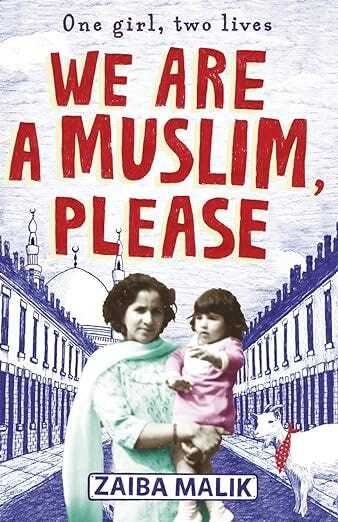
Here’s a little clip from the interview.
You can link to the full podcast via Spotify and most other streaming platforms, and you can also catch it here.
Please check it out. Even in a world filled with podcasts, we think you’ll like this one.
Thanks for reading Matt Carr’s Infernal Machine! Subscribe for free to receive new posts and support my work.



